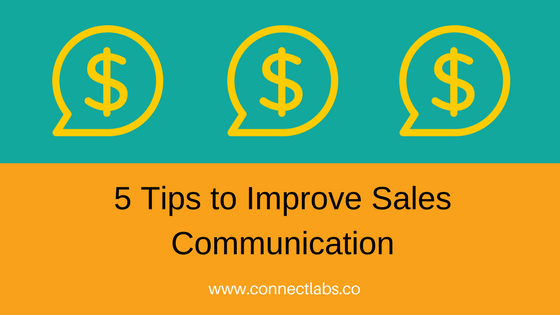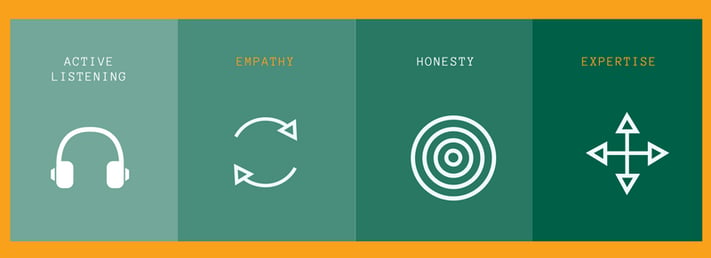
We've all been there – you're looking to buy something and you come up against an annoying salesperson who is trying to tell you want you want and why without really listening to you at all. Or even worse, you're being patronised by someone who assumes you know nothing about the product you want to buy.
This behaviour can certainly put off a lot of customers, and risks losing business simply due to the way the customer has been made to feel. Great communication with customers is vital to successfully selling your product or services. So, how can you improve your sales communication?
Try Inbound Sales.
Most of us do a fair bit of shopping online these days. It's convenient and we no longer have to rely on salespeople for advice; we can do all the research ourselves. This has fundamentally changed the buyer/seller relationship – the power has shifted from the seller to the buyer.
In a previous blog post, we outlined how Inbound Sales works. In a nutshell, the sales strategy is based on serving the buyer, rather than the seller. With the buyer's context always in mind, the following Inbound Sales tips will help improve your sales approach:

Tip 1: Practice active listening
Trying to complete a sale can be a pretty stressful task at times. There is a fair amount of pressure that comes with client meetings, and it's often very easy to let our minds race ahead to a presentation you may have prepared, or work you need to complete, or even the next steps you have in mind. However, it's really important to not only remain present with your buyer but actively listen to what they are saying. You want your buyer to know you are listening to them and understand what they are saying.
HubSpot recommends the following four steps for active listening:
- Truly listen to the prospect.
- Feed back the content and feeling of the prospect's words.
- Confirm you heard the prospect correctly.
- Ask a relevant follow-up question to further clarify your understanding of their situation.
Tip 2: Show empathy
It's really important to connect with your buyer. You don't have to agree with everything they say, but you should always try to see things from their point of view. Remember, your sales strategy should be based on serving the buyer, so you need to understand what they do, how they work and the challenges they face. People appreciate it when it's obvious you are making an effort to understand where they are coming from.
Put simply, being empathetic makes you more likeable and this increases your chance of making a sale.
Tip 3: Be an expert
Great communicators are persuasive because they are able to point to specific examples that support the point they're trying to make. In the case of a salesperson, you're trying to show the buyer how your product or service will help them. So it's critical you're an expert on your company and your industry.
Make sure you know your company's best practices and case studies. How have you helped a similar client before? How have similar challenges been overcome? Do you have a similar before and after example you can use? If you know your company and work inside out you can easily draw on past successes to highlight the suitability of your product or service.
It's also important to know the industry you're working with. What are that industry's main concerns, behaviours and buying patterns? Buyers will very quickly lose interest and trust if it's obvious you don't really understand their business. Make sure you stay up to date with industry news, trends and challenges.
Tip 4: Be honest
Buyers are more empowered now and have often done their research, so it's critical to be honest about the suitability of your product or service. If you're honest you are more likely to build trust with your buyer, and building trust is really important for not only closing a sale but for your relationship moving forward. Be honest about what you know and what you don't know. Ask the questions that are sometimes difficult to ask (or answer) if they are in the best interest of the buyer.
It's also important to be aware of any gaps in your knowledge, and more than ok to be upfront about these gaps and even ask your buyer to fill them in. They will appreciate your honesty and will be more likely to believe what you're saying when you do know the answer.
Tip 5: Don't make assumptions
So, you have been actively listening to your buyer, showing empathy, highlighting your industry expertise and honestly asking and answering questions… Now don't ruin all that good work by making assumptions! Many sales journeys can feel very similar and it's easy to slip into a routine, but it's always important to remember every sale is different and every buyer will have unique problems requiring a solution.
Only use information that has been given to you by the buyer and ask follow-up questions if there are any gaps. Never make assumptions about their situation, because if those assumptions are wrong it sends a clear message to the buyer that you have not been listening. Making a buyer feel ignored or giving them a reason to question whether you have really listened and understood can ruin a sale or have a lasting negative effect.
If you follow these five tips, you will develop an effective inbound sales approach that enables you to:
- Understand your buyer's context
- Communicate your buyer's needs back to them
- Position your products and services as a solution to your buyer's challenges
This will go a long way to ensuring you don't become that annoying salesperson we talked about earlier!
Tags:
Sales + CRM
March 1, 2017

